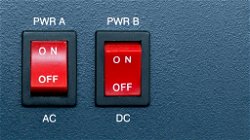Signs that Your Spark Plugs Need a Replacement
Adina Anderson
. 3 min read
The most common signs of bad spark plugs include start-up trouble, rough idling, sluggish acceleration, declining fuel economy, engine misfiring, and engine knocking. Failing to replace your spark plugs on schedule leads to poor performance in the short term, and potentially to serious damage in the long term, so don’t make the mistake of putting off service! If you’ve noticed any of the following signs and symptoms, schedule service and let us take a closer look today. Through video chat, our expert technicians can visually inspect your spark plugs, guide you through the diagnostic process, and even demonstrate proper installation techniques if necessary.

What Does a Spark Plug Do?
A spark plug is screwed into each engine cylinder; it is needed to start the engine and keep it running. The biggest demand on an ignition system is to start the car and make it run. The portion of the plug that sticks out from the engine is connected to the vehicle’s ignition system, which must provide a specific amount of electric current to generate a spark inside each of the engine’s cylinders. The electrical current from the ignition system travels to the plug’s center electrode.
That spark ignites the fuel-air mixture inside the engine cylinder. Each time a spark is created, a small explosion occurs inside the cylinder that pushes down against the top of the piston. If your vehicle has four cylinders, it has four pistons; six cylinders, six pistons, etc. each served by an individual plug.
The spark plug is a reliable workhorse. For example, at idle, say 800 rpm, the spark will fire 200 times per minute in a 4-cylinder 2.0-liter engine. As engine speed increases, say to 2,000 rpm, the plug fires 500 times per minute.
Your Check Engine Light Comes on
Worn/failed spark plugs, coil packs, or spark plug wires can trigger your check engine light to come on. In today's cars, say Firestone Complete Auto Care technicians, if a plug starts to fail then the most obvious event should be the check engine light coming on or even flashing. This can cause your engine to misfire and your check engine light to pop on. A flashing engine light could mean that potentially catastrophic misfires are taking place, say our technicians.
Symptoms of Misfiring Spark Plugs Include Rough Idling
Note that a check engine light could be potentially caused by a number of things, not just a spark plug problem. That's one reason your local Firestone Complete Auto Care offers Code Scans, which reveal any codes that indicate a misfire due to a spark plug failure. Since our facilities provide complete auto care, our technicians also have the proper tools and expertise in engine control systems, sensors, and on-board diagnostics to perform an advanced diagnostic and provide an accurate repair estimate.
The Car is Hard to Start
The battery is often blamed as the culprit for a vehicle not starting. However, spark plugs can just as easily be the cause. Your car’s engine needs to work harder to compensate for worn or clogged spark plugs. It may be challenging to start your vehicle if the weather conditions are harsh. In that case, there’s not enough spark to turn the engine over.
Slow Acceleration
If you press down on your gas pedal and the vehicle doesn’t react as quickly as usual, your spark plugs could be causing a delayed response. However, this could also be caused by other factors, such as dirty fuel injectors, faulty oxygen sensors or a bad fuel pump. So make sure to get your vehicle diagnosed by a qualified technician before paying for new spark plugs.
Your Engine is Misfiring
While a faulty ignition coil plug cap or low-quality fuel can lead to an engine misfire, the cause is usually a worn spark plug. If you find that your engine pace starts to waver, then pick up again, or you hear the engine pop when the timing is off, you could be in need of a new spark plug. When a misfire occurs, raw fuel is sent into the exhaust, causing damage to the catalytic converter.
Visual Inspection
Remove and compare your old spark plugs to a new one. If the tip and/or electrode show excessive wear they should be replaced. Also, look for fuel and oil contamination. If contamination is found, the spark plugs should be replaced. However, additional inspection is needed to determine the cause of the contamination whether it is caused by oil, fuel, or coolant. Fuel contamination can be caused by failing components within the fuel, ignition and/or emission systems.
Conclusion
In summary, spark plugs are essential components of a vehicle's ignition system, responsible for creating the spark that ignites the fuel-air mixture in the engine cylinder. Signs of bad spark plugs include start-up trouble, rough idling, sluggish acceleration, declining fuel economy, engine misfiring, and engine knocking. Failing to replace spark plugs on schedule can lead to poor performance in the short term and potentially serious damage in the long term. If you notice any of these signs and symptoms, it's essential to schedule service with a qualified technician to prevent further damage to your vehicle.
More Stories from
The Law of Conservation of Mass: A Fundamental Principle in Science
The article highlights the significance of the law, provides experimental evidence, and discusses its applications in various scientific disciplines, including chemistry, physics, environmental science, engineering, and astrophysics.
What is the Most Exciting Fact About the Solar System?
It highlights the vastness of our solar system and the history of astronomy's shift from a divine.
Understanding AC and DC: The Fundamentals of Electric Power
This article provides a concise overview of Alternating Current (AC) and Direct Current (DC), the two fundamental types of electrical power.
The Mysteries of the Brain: Recent Discoveries in Neuroscience
From the brain's remarkable adaptability to the profound link between the gut and brain, explore the cutting-edge findings shaping our understanding of cognition and behavior.
Defense Advanced Research Projects Agency (DARPA): Pioneering Innovation in Defense Technology
This article provides a concise overview of the Defense Advanced Research Projects Agency (DARPA), its mission, and its key contributions to revolutionizing defense technology.






.png?width=40&aspect_ratio=1:1)

.png?width=40&aspect_ratio=1:1)




